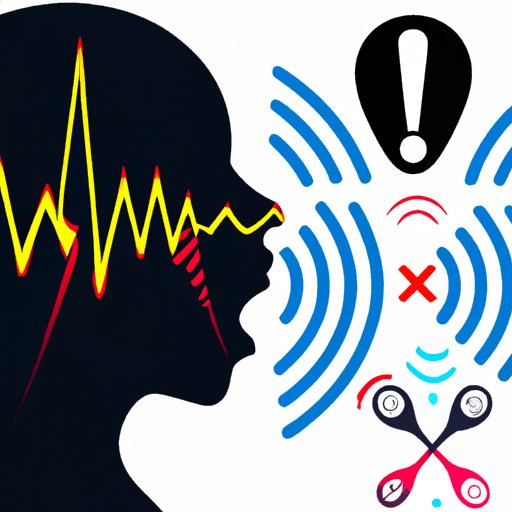I. Introduction
Losing your voice can be an uncomfortable and frustrating experience. It refers to the temporary or permanent loss of voice or hoarseness, making it difficult to speak or sing. Voice loss is a common condition that can occur due to various reasons, including medical conditions, overuse, and misuse. This article aims to explore the causes of voice loss, prevention, treatment, and the emotional impact of losing one’s voice.
II. Exploring the Anatomy of the Vocal Cords
The voice is produced by the vibration of the vocal cords, which are two bands of tissue in the throat. The vocal cords are situated in the larynx, also known as the voice box.
The structure of the vocal cords is complex, involving layers of muscle, ligaments, and membranes. The vocal cords’ size, shape, and tension determine the pitch, tone, and volume of the voice.
When air passes through the vocal cords, they close and vibrate, producing sound. The sound is then amplified by the throat, mouth, and nose, creating speech or singing.
Overuse, misuse, and medical conditions can affect the vocal cords, leading to voice loss.
III. Identifying Common Causes of Voice Loss
The most common reasons why people lose their voice are viral infections, allergies, acid reflux, and smoking.
Viral infections, such as colds, flu, and laryngitis, can inflame the vocal cords, causing hoarseness or complete loss of voice. Allergies to pollen, dust, or pet dander can also trigger inflammation and irritation of the vocal cords.
Acid reflux, also called gastroesophageal reflux disease (GERD), occurs when stomach acid flows back into the throat and irritates the vocal cords. Chronic smoking can also damage the vocal cords, leading to voice loss and other respiratory problems.
Prevention tips for each cause include getting vaccinated for flu and other infections, avoiding allergens, managing acid reflux by avoiding trigger foods and taking medication, and quitting smoking.
IV. Discussing Lifestyle Habits that Affect the Voice
Besides medical conditions, everyday habits can also lead to voice loss. Screaming, cheering loudly, or speaking too much or too loudly can strain the vocal cords, leading to hoarseness or voice loss.
It is essential to take care of your voice by following some simple habits. Drinking plenty of water, avoiding caffeine and alcohol, and avoiding smoking can help keep the vocal cords hydrated and healthy.
Avoiding clearing your throat excessively can also help protect the vocal cords. Taking breaks between long speaking engagements or performances can prevent vocal overuse and fatigue.
V. Detailing Treatments for Voice Loss
Home remedies and self-care tips for voice loss include resting the voice, drinking warm water with honey and lemon, and inhaling steam. Throat lozenges and sprays can also provide temporary relief.
If voice loss persists for more than a week or is a symptom of an underlying medical condition, medical intervention may be necessary. The medical treatments may include speech therapy, surgery, or medication.
Speech therapy can help improve voice quality, range, and endurance. Surgery may be necessary for vocal cord polyps, nodules, or other structural problems. Medication, such as antibiotics or steroids, may be prescribed for infections or inflammation.
The pros and cons of different treatments depend on the underlying cause of voice loss and the severity of the condition.

VI. Addressing the Emotional Impact of Voice Loss
Losing your voice can affect your self-esteem, relationships, and mental health. It can be frustrating and isolating, especially for people whose work requires strong vocal abilities, such as singers, actors, teachers, and public speakers.
To cope with the emotional impact of voice loss, it is essential to seek support from family, friends, or counselors. Accepting the condition and avoiding self-blame can also help reduce anxiety and stress.
VII. Interviewing Experts on Voice Loss
Insights from speech therapists, singers, vocal coaches, and other professionals who work with the voice can be helpful in understanding how to care for the voice and maintain a healthy, strong speaking voice. They may suggest warm-up and relaxation exercises, breathing techniques, voice projection, and posture advice.
VIII. Conclusion
Voice loss is a common condition that can occur due to various reasons. Understanding the causes, prevention, and treatment options can help reduce the risk of voice loss and promote vocal health. Caring for your voice by maintaining good habits, seeking medical advice when necessary, and seeking emotional support can help you recover from voice loss and maintain a healthy, strong speaking voice.
